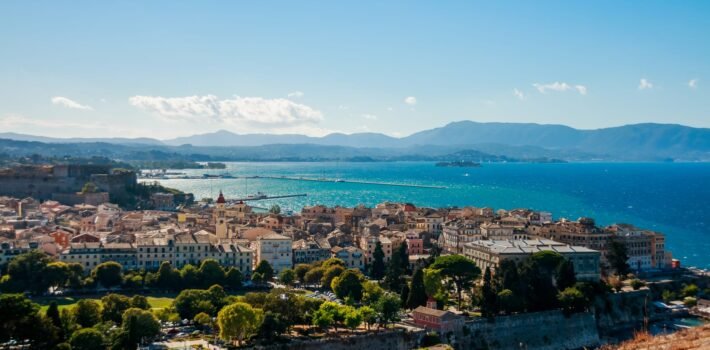Corfu Mythology & History – Greek Culture
Unveiling Corfu: A Mythological and Historical Tapestry Steeped in Greek Culture
Corfu, a captivating island adrift in the Ionian Sea, boasts a rich tapestry woven from myth, history, and enduring Greek culture. To fully appreciate its essence, we must delve into its captivating past.
A Mythological Beginning
Greek mythology provides a poetic origin story for Corfu. The island, known as Kerkyra in Greek, takes its name from the beautiful nymph Korkyra, daughter of the river god Asopos. The mighty Poseidon, god of the sea, smitten by Korkyra’s beauty, whisked her away to this unnamed island, which he named after her. Their union gave rise to Phaeax, the progenitor of the Phaeacians, a seafaring people who Homer famously portrays in the Odyssey as Odysseus’s gracious hosts.
A Strategic Gem in Antiquity
Corfu’s strategic location made it a coveted prize throughout history. Archaeological evidence suggests habitation since the Paleolithic era. In ancient times, Corfu flourished as a significant commercial center, frequented by Phoenician traders. Its power culminated in the 5th century BC, when it emerged as a major naval force alongside Athens and Corinth. The Battle of Sybota, fought near Corfu, is considered a catalyst for the Peloponnesian War, a pivotal conflict that reshaped the ancient Greek world.
A Legacy of Shifting Rule
Corfu’s strategic importance continued to attract conquerors. The island witnessed a succession of rulers, including Spartans, Illyrians, and Romans. The Roman era brought a degree of autonomy and the development of infrastructure, including roads and public buildings. Christianity arrived in the 1st century AD, transforming Corfu’s religious landscape.
A Fusion of Cultures
The following centuries saw Corfu under Byzantine and Venetian rule, shaping its architectural heritage and cultural identity. Venetian influence is particularly evident in Corfu Town’s elegant buildings and distinctive fortresses. The island’s strategic role continued during the Ottoman Wars, where it served as a vital Venetian outpost.
Corfu Today: A Legacy Alive
Corfu was ultimately reunited with Greece in the 19th century. Today, it remains a vibrant island where the echoes of its past resonate. Visitors can explore archaeological sites, marvel at Venetian architecture, and delve into museums brimming with historical treasures. Traditional festivals, music, and cuisine all carry the legacy of Corfu’s rich cultural tapestry.
Further Exploration
To fully immerse yourself in Corfu’s myth and history, consider visiting these significant sites:
Old Town Corfu: A UNESCO World Heritage Site showcasing Venetian architecture and the Old Fortress.
Achilleion Palace: A 19th-century palace built by Austria’s Empress Elisabeth.
Paleopolis: The archaeological site of Corfu’s ancient capital.
The Byzantine Museum: Housing artifacts from Corfu’s Byzantine period.
Corfu’s story is a testament to the enduring power of Greek culture. It is a place where myth and history intertwine, shaping a unique island paradise that continues to enthrall visitors from around the world.






